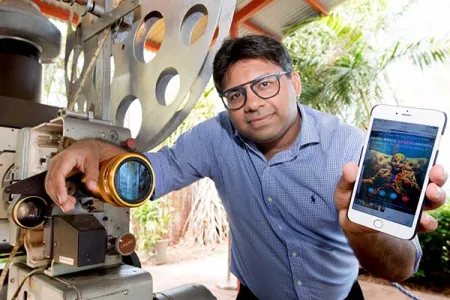CDU lecturer disrupting the movie industry
Imagine being able to watch a blockbuster movie in the comfort of your own home for a couple of dollars the day it’s released.
That’s the brave new world of film distribution envisaged by Darwin filmmaker and Charles Darwin University (CDU) Business Lecturer Dr Abhishek Shukla.
Dr Shukla secured a patent for a new means of distributing films that disrupts the traditional and decades old system of distributors and exhibitors.
“Since films have been around we have had this system where distributors take the work of a filmmaker and connect it with a network of exhibitors who, in turn, show it in cinemas to customers,” he said.
“The distributors and exhibitors swallow about 75 per cent of the ticket price paid by a consumer, which inflates box office prices but still only returns about $3 of the $15 ticket to the person who has actually taken the risk in producing the film – the filmmaker themselves.”
Dr Shukla’s vision involves digital codes for new release movies being sold in supermarkets that would cost a few dollars each. The digital code would be in the form of a sophisticated QR code and be in the format of existing gift cards. The user would use the code to stream the movie to their TV or mobile phone.
The code would allow the purchaser to watch the movie three times and would expire after 72 hours, meaning the movie could be paused and resumed several times over the three-day period.
“This is the Uber of the entertainment world. It uses the opportunities of digital technology to turn an industry, that hasn’t moved with the times, on its head. It is the movie equivalent of what streaming was to traditional television broadcasting.
“But unlike streaming services such as Netflix, my vison doesn’t involve monthly subscription fees,” Dr Shukla said.
The innovation could redefine the powerbase in the movie industry – boosting the influence of the filmmaker and consumer.
For the consumer, choice and ease were the key. They could use their big screen TV and broadband internet to watch movies anytime they wanted by simply buying an inexpensive digital code when they’re at the supermarket.
For the filmmaker, they broaden the potential audience for their film massively.
“Movie tickets are expensive, especially to see a movie you’re not sure about. But two bucks to watch when you want or on your phone is a different story. People will be more inclined to give it a go if it’s low cost and simple,” Dr Shukla said.
“So, by cutting out the distributor and exhibitors, the filmmaker gets a bigger audience for about the same return per head than the traditional system delivers with all its inefficiencies and lack of risk taking in terms of the content it’s prepared to support.”
The big benefit to filmmakers was the huge global audience Dr Shukla’s technology would allow access to.
In the United States and Australia there is one cinema per 7000 and 9000 head of population, respectively. In India, its one cinema per 100,000 head of population or six screens per one million people.
“Actual physical access to a cinema is a huge limitation to the potential worldwide audience of a film. In the populated and growing economies of India and China, going to the cinema is impossible for millions of people,” Dr Shukla said.
“But they all have a mobile phone and young people in particular have no problem consuming video content from a phone. In India alone, there are 512 million smart phones capable of connecting to the internet with that number projected to rise to 650 million by 2020.
“What my vision does is connect filmmakers with this audience by creating a means for them to access content cheaply and simply.
“This expands the audience for movies from middle class people in developed countries to a truly global audience by using digital technology,” he said.
Dr Shukla said a market feasibility analysis indicated the huge potential of this innovation.
“A prototype is ready, and all its associated back-end systems are in place including the required technological hosting and algorithms. A proof of concept process is being undertaken in June,” he said.
A team of CDU researchers is now advising on a road to market, with a network of big retailers already showing interest in the product. Partnership contracts with a pool of filmmakers also will be secured with the aim of launching the product by September in the Australian market.
